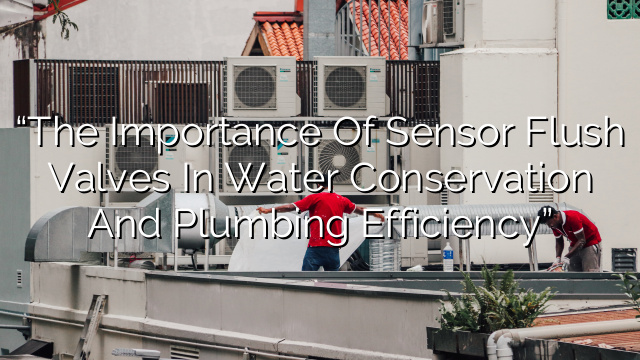Water is an essential resource that we rely on for numerous daily activities, including cooking, bathing, and cleaning. Consequently, it is crucial to ensure that our water usage is not excessive and that our plumbing systems are as efficient as possible. One way to achieve this is by incorporating sensor flush valves into our plumbing systems. In this blog post, we will delve into the importance of sensor flush valves in water conservation and plumbing efficiency.
The Functionality of Flush Valves
Before we discuss the significance of sensor flush valves, let’s first understand how traditional flush valves work. Traditional flush valves operate manually, requiring users to either push a lever or press a button to initiate the flushing process. While effective, these manual flush valves can result in excessive water usage. Users may not always be mindful of how long they keep the valve open, leading to unnecessary wastage of water.
1. Enhanced Water Conservation
Sensor flush valves play a vital role in water conservation. Unlike manual flush valves, sensor flush valves have built-in infrared sensors that detect when a user is present. As soon as the user moves away from the toilet or urinal, the sensor flush valve automatically initiates the flush cycle, ensuring that water is not wasted when it is not needed. This hands-free operation significantly reduces the risk of water being wasted due to forgetfulness or negligence.
In addition to conserving water, sensor flush valves promote sanitation and hygiene. The touchless operation of these valves eliminates the need for physical contact, reducing the spread of germs and bacteria. This feature is especially crucial in public restrooms, where a large number of people may come into contact with the same fixtures.
2. Improved Plumbing Efficiency
Inefficient plumbing systems can be a nuisance, leading to high water bills, leaks, and costly repairs. Sensor flush valves help improve plumbing efficiency in several ways:
- Reduced clogging: Sensor flush valves are designed to deliver a powerful flush, ensuring that waste is cleared effectively and minimizing the risk of clogging. This helps maintain the overall efficiency of the plumbing system.
- Proactive leak detection: Many sensor flush valves are equipped with leak detection features that can identify potential leaks early on. By promptly detecting and addressing leaks, these valves prevent water wastage and mitigate the risk of damage to the plumbing system.
- Smart technologies: Some sensor flush valves are integrated with smart technologies that monitor water usage and provide real-time data. This data can help identify patterns and detect abnormalities in water consumption, allowing for proactive maintenance and better resource management.
By incorporating sensor flush valves into plumbing systems, property owners can prevent water wastage, minimize the risk of plumbing issues, and save money in the long run.
FAQs
- Are sensor flush valves compatible with all types of toilets and urinals?
- Sensor flush valves are designed to be compatible with most standard toilets and urinals. However, it is always recommended to check the specifications of the flush valve and ensure compatibility before making a purchase.
- Can sensor flush valves be retrofitted onto existing plumbing systems?
- Yes, sensor flush valves can generally be retrofitted onto existing plumbing systems with minimal modifications. However, it is advisable to consult a professional plumber to assess the feasibility of retrofitting and ensure a proper installation.
- Do sensor flush valves require regular maintenance?
- Like any other plumbing fixture, sensor flush valves may require periodic maintenance to ensure their optimal performance. Regular cleaning and inspection of the sensors, as well as checking for any blockages or malfunctions, can help maintain the efficiency of the valves.
- Do sensor flush valves consume more energy compared to manual flush valves?
- While sensor flush valves do require a power source, such as batteries or electricity, they are designed to operate efficiently and minimize energy consumption. Sensor flush valves typically have power-saving features and are programmed to conserve energy when not in use.
- Are sensor flush valves suitable for both residential and commercial use?
- Yes, sensor flush valves are suitable for both residential and commercial use. They are commonly found in public restrooms, office buildings, hotels, and residential properties. The hands-free operation and water-saving features make them an ideal choice for a wide range of applications.





